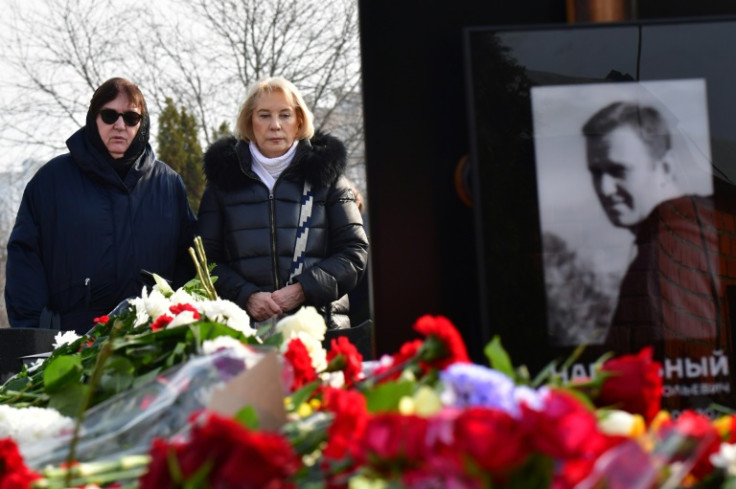Navalny's Mother Visits Grave After Funeral Draws Thousands

The mother of Russian opposition leader Alexei Navalny visited his grave on Saturday, a day after thousands of Russians had risked arrest to pay tribute to the anti-corruption campaigner at his funeral.
Navalny, President Vladimir Putin's fiercest critic for more than a decade, died in an Arctic prison colony last month, where he was serving a 19-year sentence on "extremism" charges largely seen as political retribution for his opposition to the Kremlin.
His mother, Lyudmila Navalnaya, visited his grave, which was covered in flowers and wreaths, at the Borisovo cemetery in southern Moscow early on Saturday morning, AFP journalists saw.
She was accompanied by Alla Abrosimova, the mother of Navalny's widow, Yulia Navalnaya.
Yulia Navalnaya, the couple's two children and Navalny's brother all live abroad and did not attend the funeral, where they could have been arrested for their own opposition to Putin.
Yulia Navalnaya has pledged to continue her husband's work and said Putin "murdered" Navalny.
AFP journalists on Saturday saw a trickle of mourners laying flowers at his grave and a continued police presence at the cemetery, close to the banks of the Moskva river.
Thousands of Navalny's followers had queued for hours to pay their respects to the 47-year-old on Friday.
As they streamed from a nearby church to the cemetery, some chanted "No to war!", and other pro-Navalny slogans, including branding Putin a "murderer" and calling for the release of political prisoners.
Rights monitoring group OVD-Info said Russian police had arrested at least 128 people attending tributes to Navalny in 19 cities on Friday.
Scenes of thousands marching in support of Navalny, demanding an end to Russia's offensive in Ukraine and blasting the Kremlin, have not been seen in Russia since the first days after Moscow ordered hundreds of thousands of troops across the border in February 2022.
The Kremlin has cracked down hard on dissent and used strict military censorship laws to prosecute hundreds that have spoken out publicly against the campaign.
© Copyright AFP 2023. All rights reserved.





